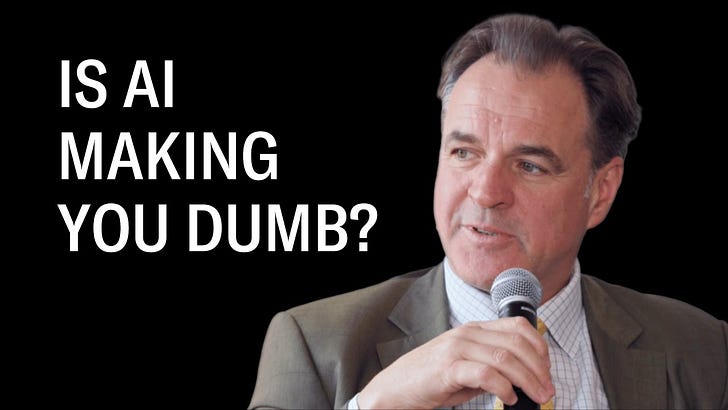Niall Ferguson on tech & the university
The challenge of AI seems a rare opportunity to restore higher education. Listen to Niall Ferguson talk about the problem & the policies he recommends, both as an academic & as a cofounder of the University of Austin, Texas. AI means we now have objectified evidence of the principle that used to be the secret of a few serious people: Everybody cheats. Morality has simply been evacuated from higher education. One could think about this problem at length & Ferguson’s policy proposal is an aid to that thinking: Written &, preferably, oral examinations in person are the only proper basis of judgment in higher education, because they reestablish the trust, or truthfulness that must connect teacher & student. Ferguson’s opposition to grade inflation, grade compression, & the flattery involved is connected to this problem.
Ferguson goes farther & recommends a second policy: Neo-medievalism. He calls it The Cloister, long periods of time everyday throughout term for study & discussion, banning smartphones. Student life should be largely about studying & it should be life, not just a job. This policy also follows from what “studies show,” which used to be the complaint of the kinds of moralistic figures we no longer see around: Students don’t read much. I.e. turning life into a job also led to young people being very bad at that job. The Cloister, however, also involves a problem that comes up in the q&a, that techies & humanists aren’t usually friends. Ferguson reminds us of C.P. Snow’s “The Two Cultures,” but doesn’t really have an answer. I was reminded of a funny story in Allan Bloom’s Closing of The American Mind:
A perfect illustration of this situation appeared a few years ago in a New York Times account of the visit of a professor of music to Rockefeller University. The life scientists working there brought bag lunches to the musicologist's lecture. The project was inspired by C. P. Snow's silly conceits about "the two cultures," the rift between which he proposed to heal by getting humanists to learn the second law of thermodynamics & physicists to read Shakespeare. This enterprise would, of course, be some thing other than an exercise in spiritual uplift only if the physicist learned something important for his physics from Shakespeare, & if the humanist similarly profited from the second law of thermodynamics. In fact, nothing of the sort ensues. For the scientist the humanities are recreation (often deeply respected by him, for he sees that more is needed than what he offers, but is puzzled about where to find it), & for the humanist the natural sciences are at best indifferent, at worst alien & hostile.
The Times quoted Joshua Lederberg, the president of Rockefeller University, from which philosophy had recently been banished, as saying after the lecture that C. P. Snow was on the right track but “counted wrong”—there are not two but many cultures, one example of which is that of the Beatles. This represents the ultimate trivialization of a trivial idea that was just a rest station on a downward slope. Lederberg saw in the humanities not the human knowledge that complements the study of nature but merely another expression of what was going on in the world. In the end, it is all more or less sophisticated show business. With a kind of wink at his audience Lederberg lets us know that in this sea of democratic relativism natural science stands out like Gibraltar. All the rest is a matter of taste.
By the way, Lederberg was a microbiologist who won the Nobel for medicine for his study of bacteria, graduated with his MD at 19 & PhD at 22, & was the son of a rabbi. He had a remarkable career in gov’t science, too, involving himself in everything from NASA to AI. You can read his glowing obit in the NYT. I couldn’t find the piece Bloom quotes online, but he’s basically right about what has come of scientists & of the university. The level at which he raises the problem is the level at which UATX would have to think about it… Ferguson will not be able to solve it, but if he raises it, he is also in a position to hire people who can deal with it adequately.
The mix of the humanities & science Ferguson recommends is the sci-fi stories of Neal Stephenson, specifically The Diamond Age (for AI & education) & Snowcrash (tech-oligarchy dystopia). I second his recommendation, these stories are much better than what fashionable intellectuals can offer these days.
The speech as a whole is interesting, as well as the q&a which makes up the latter half of the video. A good reminder of the remarkable things that are not only possible, but actual in America!



